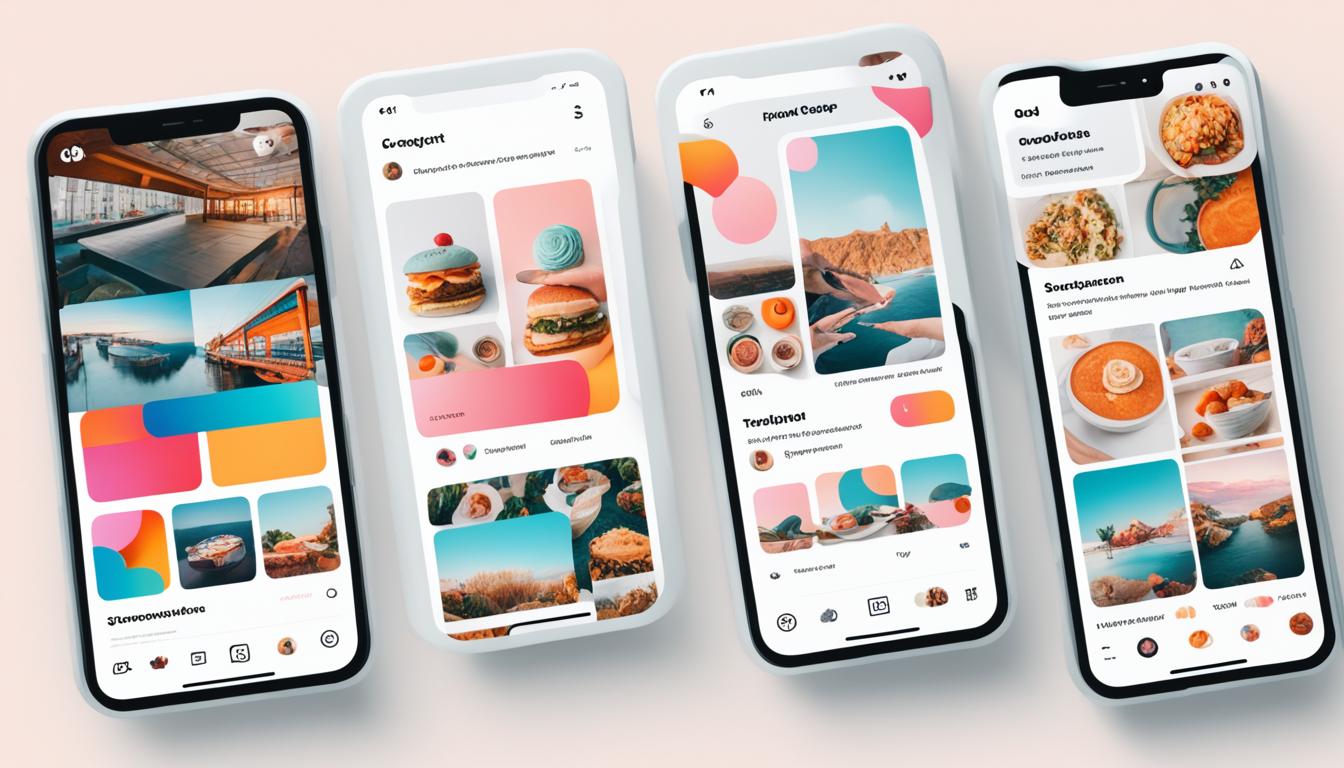Social Media Reach: Statistics For 2024
Uncovering the latest trends and numbers shaping the social media landscape.
Did you know that 62.3% of the world's people use social media? They spend about 2 hours and 23 minutes each day looking at their feeds1. This shows how big of an impact social media has on our lives. It also shows its power as a tool for digital marketing trends.
The number of social media users worldwide has jumped to 5.07 billion. That's 259 million new users in just one year1. This growth has changed how we connect, share info, and decide what to buy. Now, platforms like Instagram, Pinterest, LinkedIn, Reddit, and Twitter are where people go to find new products and brands1.
For marketers or business owners, knowing these trends is key to staying ahead in social media marketing. Understanding the power of social media marketing is essential.
Key Takeaways
Over 62% of the global population uses social media
Users spend an average of 2 hours 23 minutes daily on social platforms
Social media users worldwide have grown to 5.07 billion
259 million new users joined social media in the past year
Social platforms significantly influence brand discovery and purchase decisions
Instagram, Pinterest, LinkedIn, Reddit, and Twitter are popular for product research
The Global Social Media Landscape in 2024
Social media is growing fast, changing how we connect and talk to each other. In 2024, we see interesting trends about how many people use social media worldwide and in different places.
Total Number of Social Media Users Worldwide
There are a lot of people using social media, and it's getting bigger. In 2023, around 4.9 billion people used social media, and this number might hit 5.85 billion by 20272. This shows how important social media has become in our lives.
Average Daily Time Spent on Social Media
Now, social media is a big part of our daily life. People spend about 145 minutes on it every day2. This shows how engaging these platforms are and how they keep us connected.
Social Media Penetration by Region
How much people use social media varies a lot around the world. Let's see how different regions compare:
Region Social Media Penetration
Northern and Western Europe 79-80%
Eastern Asia 75%
North America 71%
Southern America 68%
Western Africa 16%
Middle and Eastern Africa 10%
These numbers show how different regions use social media at different levels. Some areas have a lot of users, while others are just starting. This means there's a lot of room for growth and new opportunities in digital expansion.
Most Popular Social Media Platforms
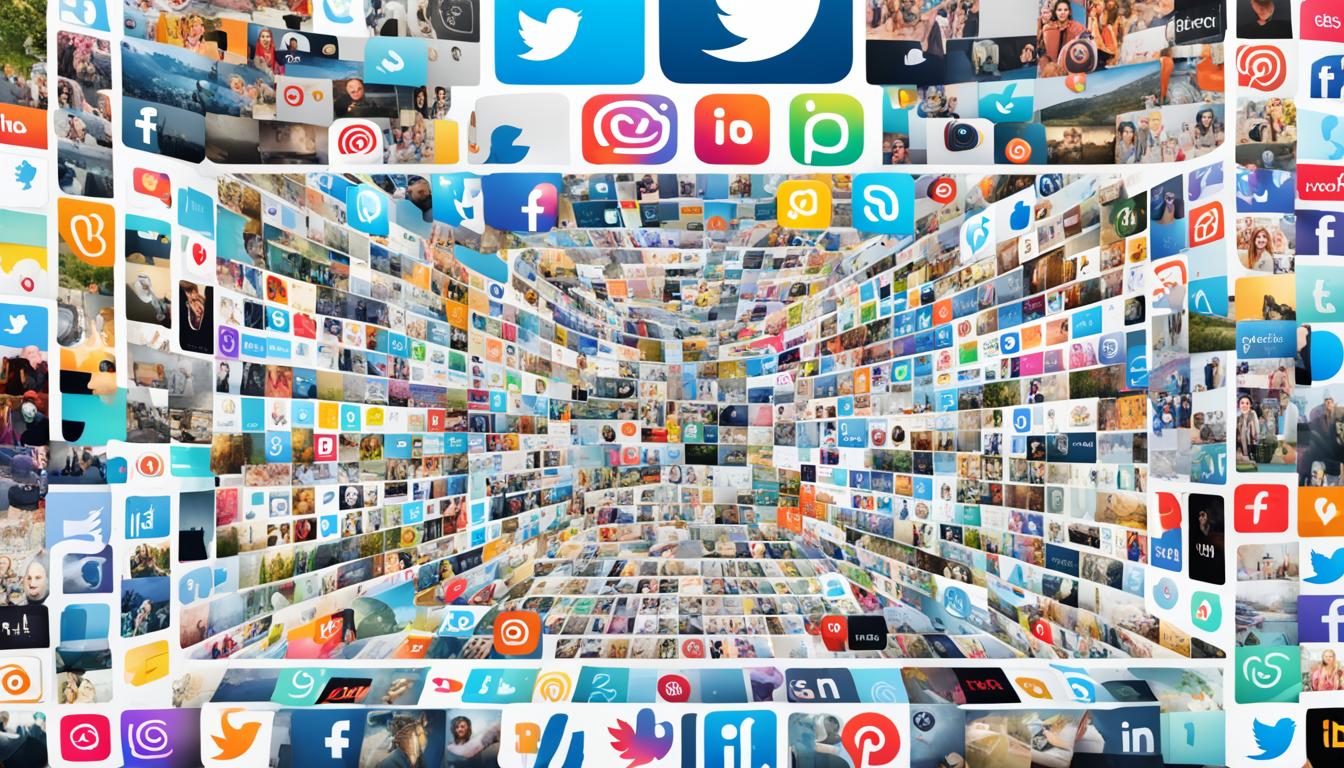
Social media is a big part of our lives, with many platforms competing for our attention. Facebook is at the top with 3 billion people using it every month3. It's popular with all kinds of people because of its wide reach.
YouTube is a close second, with 2.5 billion users and making $29.24 billion in 20223. These numbers show how big YouTube is in sharing and watching videos.
Instagram has become very popular, with 2 billion users every month3. Its focus on photos and videos makes it appealing to many. It's especially good at reaching people, with a 20% rate.
TikTok has quickly become a big deal, with 1.5 billion users since starting in 20163. Its fast growth shows how users' tastes and habits are changing.
Platform - Monthly Active Users
Facebook: 3 billion
YouTube: 2.5 billion
Instagram: 2 billion
TikTok: 1.5 billion
Year Launched
Facebook: 2004
YouTube: 2005
Instagram: 2010
TikTok: 2016
Facebook is still the top choice, but others are catching up. Snapchat has 800 million users, and Twitter (now X) has 611 million3. These numbers show how diverse social media is and how different people use it.
Demographics of Social Media Users
Knowing who uses social media is key for businesses and marketers. Let's look at the age and gender of users to understand their habits better.
Age Distribution Across Platforms
People of all ages use social media, but some groups are more active than others. Young adults, aged 18-29, lead with 84% using social media sites. This number drops to 81% for those 30-49 and 73% for 50-64-year-olds. Yet, 45% of those 65 and older are also online4.
Gender Split in Social Media Usage
More men than women use social media, but the difference is small. On Instagram, for example, 51.8% are men and 48.2% are women5. This pattern is seen across many platforms, showing how the internet is used by both genders.
Geographic Variations in Social Media Adoption
How much people use social media varies by region. India has the most Instagram users at 229.5 million, followed by the U.S. with 149.35 million5. Developed areas tend to use it more than less developed ones. Nigerians, however, spend over four hours a day on social media4.
Platform - Monthly Active Users
Facebook: 3.03 billion
Instagram: 2 billion
Pinterest: 465 million
X (formerly Twitter): 666 million
Daily Active Users
Facebook: 2.085 billion
Instagram: 500 million
Pinterest: N/A
X (formerly Twitter): 245 million
These numbers show the wide range of people using social media. Knowing this helps you plan your social media better to reach your audience6.
Social Media Growth Trends
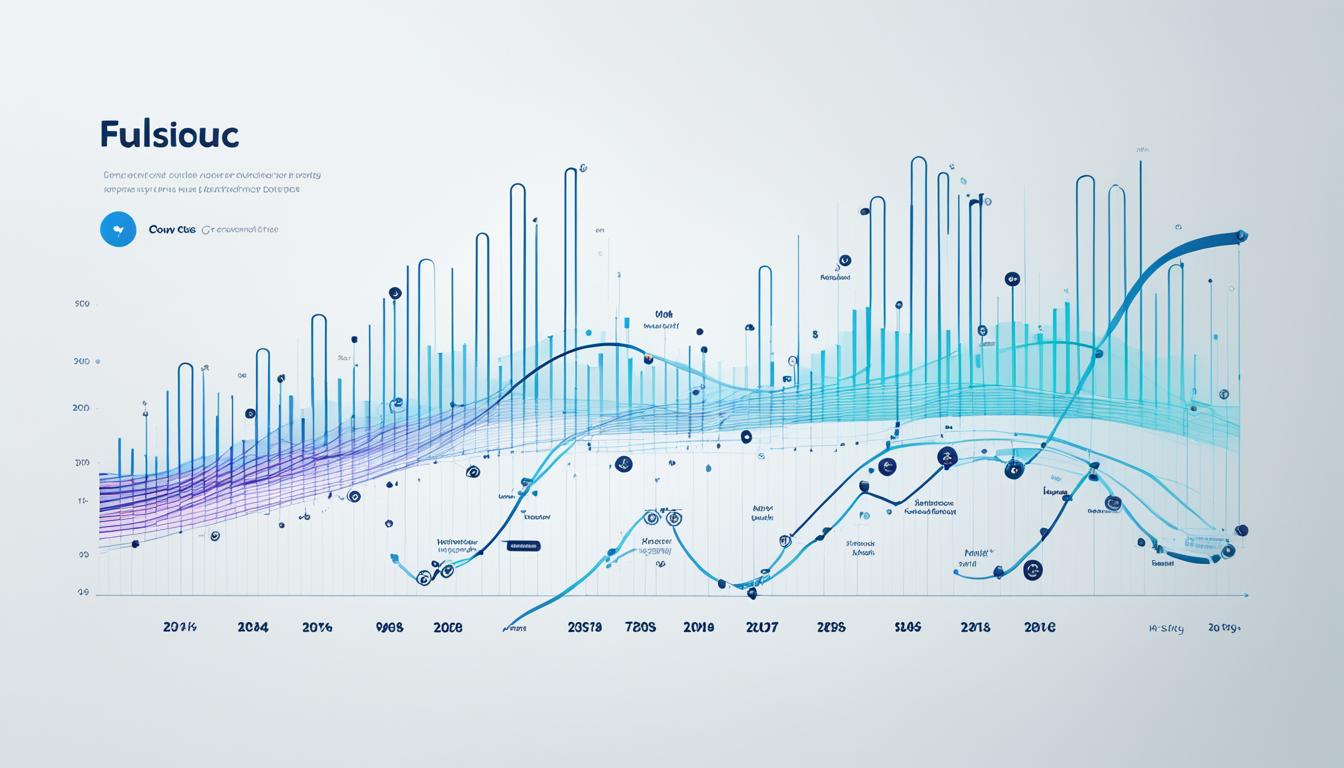
The world of social media is changing fast, with more people joining and spending money on these platforms. In 2023, we're seeing a big jump in user numbers and ad spending on different platforms.
Instagram's organic reach dropped to 13.51% in July 2022, a 29% fall from the year before. Facebook's reach also went down from 10.43% to 8.6% in the same time7. These changes show how social media engagement is evolving.
Even though organic reach is down, social media ads are getting bigger. This year, we expect to see social media ad spending hit $268.7 billion, with a growth rate of 9.4% a year until 20277. This shows how important paid ads are becoming in social media marketing.
New markets are helping social media grow. Countries with lots of young people, like Nigeria, the Philippines, and India, are showing high engagement. This is changing the way social media works around the world.
Platform Organic Reach Ad Revenue
Instagram 13.51% $43 billion
Facebook 8.6% Part of Meta's $113 billion
Influencer marketing is becoming more popular. Research shows 37% of consumers trust influencers more than brands. Influencer content often gets more engagement than brand content8. This trend is changing how marketers work.
As social media keeps growing, marketers need to keep up with these changes. They should understand how each platform works and use both organic and paid strategies to succeed in this fast-changing digital world.
Instagram Organic Reach: What You Need to Know
Instagram's organic reach is key for businesses and creators wanting to grow their audience. Knowing how the Instagram algorithm works can help increase your content's visibility and engagement.
Factors Affecting Instagram Organic Reach
The Instagram algorithm looks at many things when deciding on organic reach. Post engagement, content relevance, and user behavior are big factors. Instagram likes posts that mix up formats like photos, graphics, IGTVs, Reels, Stories, and Live videos9.
Strategies to Improve Organic Reach on Instagram
Here are some ways to boost your organic reach on Instagram:
Use relevant hashtags: Instagram lets you use up to 30 hashtags, but 3-5 work best for engagement910.
Post consistently: Use a scheduler to keep a regular posting schedule10.
Engage with your audience: Answer comments to show you value your followers10.
Create high-quality content: Aim for posts that get shared and saved9.
Collaborate with creators: Work with influencers to make authentic content9.
Comparing Instagram's Organic Reach to Other Platforms
Instagram often beats other social media in organic reach. Here's how reach varies by follower count:
Follower Count In-feed Posts
500-2,000: 292 people
2,000-10,000: 964 people
10,000-50,000: 4,400 people
Instagram Stories - Instagram Reels
500-2,000: 1,600 people
2,000-10,000: 3,400 people
10,000-50,000: 16,800 people
These figures show the big reach potential, especially with Instagram Reels11. For brands with less than 501K followers, aim to reach 34% of your audience with posts and 7.5% with Stories11.
By using these strategies and understanding Instagram's algorithm, you can greatly increase your content engagement and grow your audience.
Social Media's Impact on Consumer Behavior
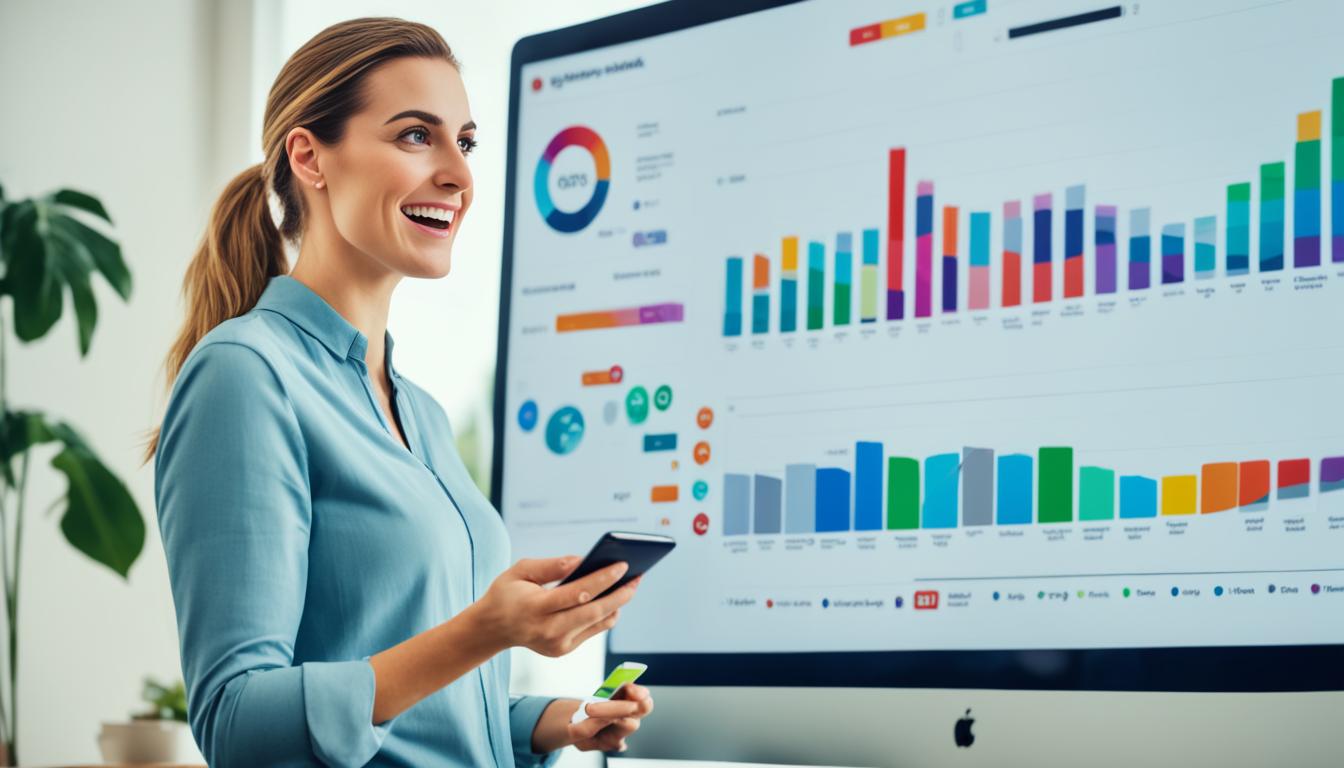
Social media has changed how we make decisions and find new brands. Seven out of ten Americans use social platforms, giving businesses a great chance to connect with their audience12. This shift has changed shopping and how we interact with brands.
Look at the power of social commerce. Eighty percent of consumers buy things because friends recommended them on social media12. This shows how crucial social proof is in our buying habits.
Brands are now reaching out to consumers in new ways, not just through ads. Social selling helps companies reach more people and increase sales across different platforms12. For example, Instagram Shopping lets users buy products right from their feed.
"Social media serves as a valuable tool for businesses to connect with customers and drive sales."
Influencers play a big role in helping brands get noticed. When influencers talk positively about a product, it can boost its popularity and sales12. This has led to more companies using influencer marketing.
Social Media Impact - Percentage
Consumers using social media: 70%
Purchase decisions based on social recommendations: 80%
Average social platforms used per month: 6-7
Businesses are using smart algorithms to reach the right people on social media12. They target by looking at demographics, location, and interests. This way, ads get to those most likely to buy.
As social commerce grows, brands need to keep up with what consumers want. Answering questions on social media can make a brand look good and get more people talking12. By following these trends, companies can use social media to grow and build strong relationships with customers.
Engagement Rates Across Social Platforms
Understanding how people interact with your content on social media is crucial. Let's look at the latest numbers for big platforms.
Facebook Engagement Statistics
Facebook sees different engagement rates across industries. Government pages top with a 2.19% rate, while food and beverage brands get 1.93%13. The overall average engagement is just 0.15%, showing the tough competition for attention14.
Instagram Engagement Metrics
Instagram keeps a steady engagement rate of 0.70%. The education sector does best with a 2.55% rate, more than twice the average1314. Reels are now the top type of post, beating out carousels and static posts15.
Twitter and LinkedIn Engagement Rates
Twitter has the lowest engagement rate at 0.05%, the lowest among big platforms14. LinkedIn, however, shows strong potential, with professional services and consulting getting a 1.21% rate13. Both platforms see more interaction in tech and education fields.
Platform Average Engagement Rate Top Performing Industry
Facebook 0.15% Government (2.19%)
Instagram 0.70% Education (2.55%)
Twitter 0.05% Entertainment (1.45%)
LinkedIn 1.21% Government (1.91%)
To improve your social media engagement, make sure your content adds value and fits each platform's strengths. Remember, engagement rates change, so adjust your strategy as needed131415.
Video Content Dominance in Social Media

Video content is now a big deal in social media, changing how we use and enjoy online info. In 2024, Facebook and Instagram see more people engaging with videos than other types16. This makes sense, since over 1 billion hours of videos are watched on YouTube every day, and Facebook gets 8 billion video views daily17.
Short videos are huge in social media marketing. TikTok, downloaded over 2 billion times, and Instagram Stories, used by over 500 million people daily, lead this trend17.
Video really affects how people shop. About 90% of customers say videos help them decide what to buy. Adding video to marketing can increase sales by up to 80%17. That's why companies are using video more to reach their audience.
Even though short videos are big, long videos are coming back. In 2024, TikTok videos up to 10 minutes long are becoming more common, showing a change in how we watch content18.
Video is more than a trend; it's the future of social media content. Brands that get video marketing will really stand out in reaching and engaging their audience.
Here's a look at how video content is doing on different platforms:
Platform - Video Engagement Metric
YouTube: Daily Watch Time
Facebook: Daily Video Views
Instagram: Daily Stories Users
Twitter: Engagement Increase
Statistic
YouTube: 1 billion+ hours
Facebook: 8 billion
Instagram: 500 million+
Twitter: 10x with video
As video marketing keeps changing, businesses need to keep up. With predictions showing 82% of online content will be video by 2022, the move to video in social media is clear17. To stay ahead, focus on making engaging, platform-specific video content that speaks to your audience.
Social Media Advertising Statistics
Social media ads are a big deal in digital marketing. In 2024, they're expected to grow by 13.5% in the US, reaching $82.88 billion19. This shows how vital social platforms are for ads.
Video ads are a big part of this growth, making up 55.2% of ad spending. They're expected to jump by 21.2% to $45.75 billion. This is thanks to platforms like TikTok, Instagram Reels, and YouTube19. Users love these videos too, with Instagram Reels getting an average engagement rate of 1.23%20.
Since 2019, paid social media has seen a 27.7% increase in spending. This lets businesses target ads to specific groups based on their interests and behaviors21. Marketers get detailed insights on ad performance, helping them improve their strategies for a better return on investment21.
Organic social media brings in 100% more leads than paid social media21. Yet, more businesses are mixing organic and paid strategies. This mix helps reach more people and use the best of both worlds21.
Influencer marketing is on the rise, with 58.2% of US marketers planning to use Instagram Reels for campaigns20. This shows how important real, engaging content is in social media ads.
The Rise of Social Commerce

Social shopping is changing how we buy and sell online. By 2024, US adults will spend 11.4% of their daily time on social platforms. This shift is making social commerce a big deal, expected to hit $8 billion by 203022.
Percentage of Users Purchasing Through Social Platforms
More and more people are shopping on social media. By 2024, 110.4 million US social buyers will make up 42.0% of internet users and 50.3% of social media users23. Young adults are leading this charge, with 28% of US digital buyers aged 18-34 shopping on Instagram, 26% on Facebook, and 22% on TikTok23.
Most Popular Social Commerce Platforms
Facebook is leading in social commerce, expected to have 64.6 million buyers in 202423. Instagram is close behind with 46.8 million US social buyers in 202423. TikTok is quickly catching up, with forecasts showing 107.8 million users by 202423.
Platform - Projected US Buyers/Users (2024)
Facebook: 64.6 million
Instagram: 46.8 million
TikTok: 107.8 million
Future Projections for Social Commerce
The future of social commerce looks promising. US retail social commerce sales will exceed $100 billion in 2025, growing by 22.4% from the year before23. Globally, social commerce is expected to hit $2.9 trillion by 202624. This growth is driven by more in-app purchases and social media's impact on consumer behavior.
To take advantage of this trend, brands should work with influencers and use strong analytics tools. As social commerce grows, staying adaptable and experimenting will be crucial for success in this changing market222324.
Influencer Marketing on Social Media
Influencer marketing is growing fast, with spending increasing 3.5 times more than social ads in 202325. This shows how powerful influencer partnerships are in reaching people. Brands are now using brand ambassadors and micro-influencers to get noticed and engage more on social media.
The creator economy is booming, valued at $65.2 billion in 2023 and expected to hit $74.0 billion in 202425. This growth is thanks to more creators around the world, with Adobe predicting up to 303 million of them25. These numbers show the huge potential for brands to use influencer marketing.
Social media is where influencer marketing shines. In 2024, 129.5 million US Gen Zers and millennials will be on social media, with nearly 70 million millennials25. This group loves influencer content, making them key for brands wanting to grow.
Working with influencers can really help a brand grow its network and reach more people26. Influencers build trust with their followers, which helps brands increase their organic reach and get more engagement.
Year - Influencer Marketing Spend - Year-over-Year Increase
2024 - $5.89 billion - 14.7%
Influencer marketing is proving to be effective, with advertisers planning to spend $5.89 billion on it in 2024, a 14.7% jump from last year25. This shows how much the industry believes in influencers to boost engagement and sales.
Influencer partnerships are not just a trend; they're becoming a cornerstone of modern marketing strategies.
To make the most of influencer partnerships, brands should aim for authentic and engaging content that speaks to their audience. This way, they can fully benefit from influencer marketing and see real results in the changing social media world.
Mobile vs. Desktop Social Media Usage
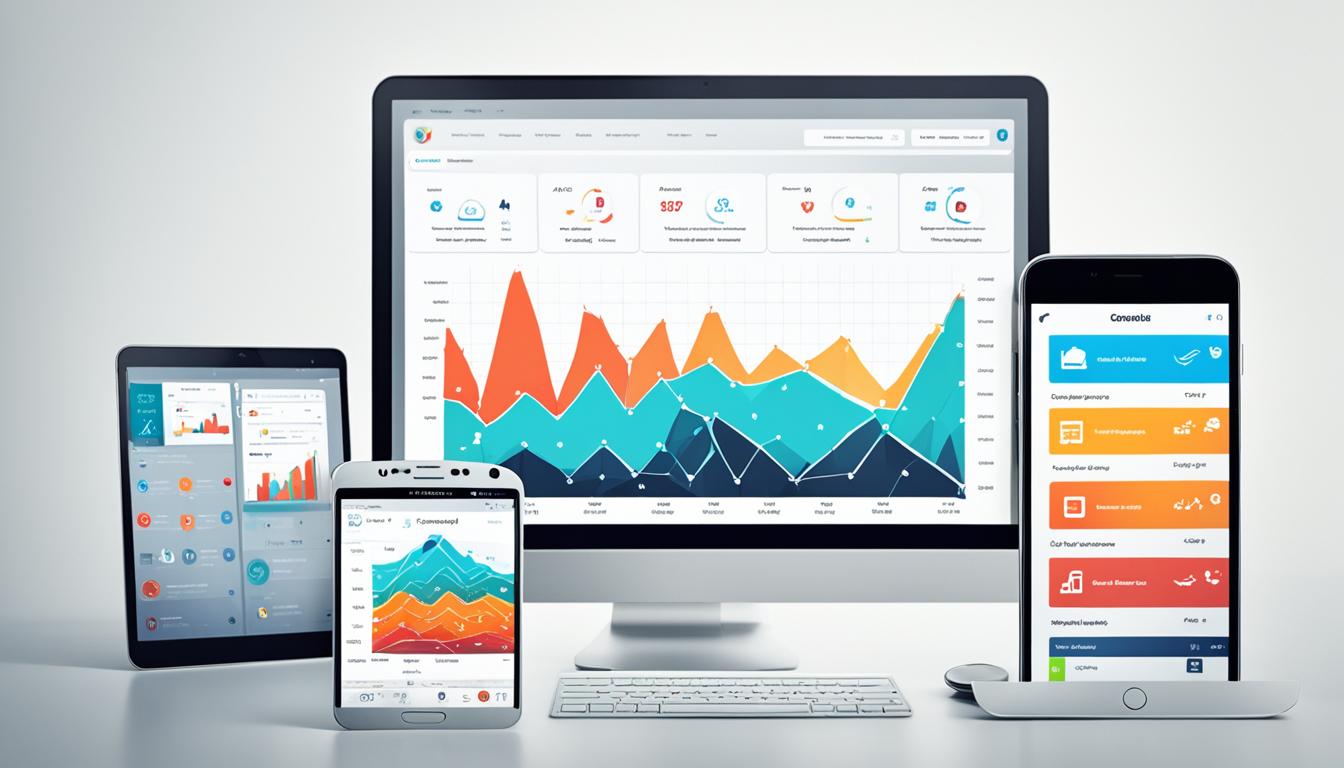
Social media is now mostly used on mobile devices. The move to responsive design and apps has changed how we connect online. Today, 5.17 billion people use social media, with each person using 6.7 different networks a month27.
Mobile devices are the top choice for social media. A huge 91% of users get to social media through their phones28. This shows how crucial it is for marketers and businesses to have mobile-friendly content.
Here are some interesting facts:
YouTube gets almost 90% of its visits from mobile devices27.
Facebook has 3.05 billion monthly users, many of whom use smartphones27.
TikTok is set to reach over 2 billion users in 2024, focusing mainly on mobile27.
Mobile's influence goes beyond social media. By early 2024, the U.S. had 396 million active mobile connections, covering 116.2% of its people28. This shows the need for responsive design on all digital platforms.
But desktop isn't forgotten. Desktop users often spend more time on sites and look at more pages than mobile users29. This means while mobile leads in user numbers, desktop is still key for deep engagement.
Looking ahead, mobile use will likely keep growing. By 2025, most internet users will use smartphones only28. This forecast highlights the growing need for mobile-first strategies in social media and other areas.
Conclusion
As we conclude our look at social media reach for 2024, it's clear the digital marketing world is always changing. The drop in organic reach on platforms like Instagram, down by more than 50% since 2015, brings new hurdles for businesses30. This means it's time to rethink your social media strategy to keep up.
To tackle these changes, focus on making content that really speaks to your audience. Instagram Stories and Reels are great for getting more eyes on your content31. The key to the future of social media is building real connections and engaging with your audience. So, invest in video content since it tends to get more engagement32.
Stay flexible and watch for new trends in digital marketing. Use influencer partnerships and content from your users to grow your reach naturally3132. By knowing what your audience likes and always offering value, you can beat the algorithm changes and build a loyal community. The social media scene may shift, but with the right strategy, you can turn these changes into chances for growth and connection.
FAQ
How many people use social media globally in 2024?
By 2024, a whopping 5.07 billion people worldwide use social media. This means 62.3% of the world's population is active on these platforms.
What is the average daily time spent on social media?
People spend an average of 2 hours and 23 minutes daily on social media.
Which region has the highest social media penetration?
Northern and Western Europe lead with the highest social media use at 79-80%. Eastern Asia follows closely at 75%.
What is the most popular social media platform globally?
Facebook tops the charts with 2.9 billion users every month.
Which age group is the most active on social media?
The 18 to 29 age group is the most active, with 84% using social media sites.
What factors influence Instagram's organic reach?
Post engagement, content relevance, and user behavior all play a part in Instagram's organic reach.
How many social media users have made purchases based on social media posts?
A significant 76% of users have bought something they saw on social media.
What is the average click-through rate (CTR) for social media ads?
In 2022, the average click-through rate (CTR) for social media ads was 1.21%.
What type of video content is most engaging on social media?
Short-form videos, under a minute long, are the top choice for engagement, being 2.5 times more engaging than longer ones.
What percentage of businesses use social media to reach customers?
A big 77% of businesses use social media to connect with customers. Of these, 41% see it as a key way to make money.
How popular is influencer marketing on social media?
Half of Millennials trust influencers' advice, more than they trust celebrities (38%). This shows how big influencer marketing is.
What percentage of social media users access platforms via mobile devices?
A huge 99% of users get to social media through mobile devices. And 78% only use their phones for it.
Source Links
Global social media statistics research summary 2024 [May 2024] - https://www.smartinsights.com/social-media-marketing/social-media-strategy/new-global-social-media-research/
Top Social Media Statistics And Trends Of 2024 - https://www.forbes.com/advisor/business/social-media-statistics/
The Top 10 Social Media Sites & Platforms - https://www.searchenginejournal.com/social-media/social-media-platforms/
Top Social Media Statistics And Trends Of 2024 - https://forbes.com/advisor/business/social-media-statistics/
Instagram statistics you need to know for 2024 [Updated] - https://sproutsocial.com/insights/instagram-stats/
The 2024 Social media demographics guide - https://khoros.com/resources/social-media-demographics-guide
Is Organic Social Media Dead? - https://gravitalagency.com/blog/digital-marketing/organic-social-media-reach-isnt-dead-just-dying/
Council Post: Are The Days Of Organic Social Media Reach Over? - https://www.forbes.com/sites/forbesagencycouncil/2023/04/27/are-the-days-of-organic-social-media-reach-over/
How to Increase Organic Reach on Instagram [in 2024] - https://insense.pro/blog/how-to-increase-organic-reach-on-instagram
12 Ways to Improve Your Instagram Organic Reach — Amy Shamblen Creative - https://www.amyshamblen.com/blog/12-ways-to-improve-your-instagram-organic-reach
Increase Your Instagram Reach: 10 Simple Tactics You Can Try Today - https://buffer.com/library/increase-instagram-reach/
Council Post: How Social Media Impacts Consumer Buying - https://www.forbes.com/sites/forbesagencycouncil/2022/04/28/how-social-media-impacts-consumer-buying/
Average Engagement Rates for 12 Industries [January 2024] - https://blog.hootsuite.com/average-engagement-rate/
2024 Social Media Industry Benchmarks | Socialinsider - https://www.socialinsider.io/blog/social-media-benchmarks/
2024 Social Media Industry Benchmark Report - https://www.rivaliq.com/blog/social-media-industry-benchmark-report/
How to Master Organic Social Media Growth on Instagram and Facebook - https://socialhospitality.com/2024/02/how-to-master-organic-social-media-growth-on-instagram-and-facebook/
The Shift to Video Content: Strategies for Social Media Dominance - https://www.creativetrnd.com/blog/the-shift-to-video-content-strategies-for-social-media-dominance
The Evolving Landscape of Social Media Marketing - https://www.hydracreative.com/news/the-evolving-landscape-of-social-media-marketing-what-you-need-to-know
Organic vs. Paid Social Media: Differences and Strategic Tips - https://blog.hootsuite.com/organic-vs-paid-social-media/
7 Key Instagram Reels Statistics for Marketers to Know - Strike Social - https://strikesocial.com/blog/7-key-instagram-reels-statistics-for-marketers-to-know/
Organic vs Paid Social Media: Make the Right Choice - https://www.sprinklr.com/blog/organic-vs-paid-social-media/
Council Post: Social Commerce: The Next Stage In E-Commerce Growth - https://www.forbes.com/sites/forbesbusinesscouncil/2024/04/03/social-commerce-the-next-stage-in-e-commerce-growth/
Guide to social commerce and the evolving path to purchase - https://www.emarketer.com/insights/social-commerce-brand-trends-marketing-strategies/
What is Social Commerce? Trends and Key Insights for 2024 - Shopify - https://www.shopify.com/enterprise/blog/social-commerce-trends
Guide to influencer marketing: Trends, tactics, and KPIs - https://www.emarketer.com/insights/influencer-marketing-report/
7 Proven Strategies to Boost Organic Reach on Social Media - Durée & Company - https://dureeandcompany.com/organic-reach-on-social-media/
50+ Must-know social media marketing statistics for 2024 - https://sproutsocial.com/insights/social-media-statistics/
Mobile vs. Desktop usage | Allconnect.com - https://www.allconnect.com/blog/mobile-vs-desktop
Mobile vs Desktop Use and Trends in 2024 - https://www.semrush.com/blog/mobile-vs-desktop-usage/
Instagram: Is Organic Reach Dead? - https://medium.com/new-writers-welcome/instagram-is-organic-reach-dead-7c2a3dae190a
Reviving Your Organic Reach on Instagram: A Guide to Crafting a Unique Strategy - https://www.logicloopdigital.com/blog/reviving-your-organic-reach-on-instagram-a-guide-to-crafting-a-unique-strategy/
Why Is Organic Reach Declining? (2024 Alternatives Included) - https://www.linkedin.com/pulse/why-organic-reach-declining-2024-alternatives-vassi-rangelova-im7wf
Sai Rahul
Jul 31, 2024
Latest posts
Discover other pieces of writing in our blog



